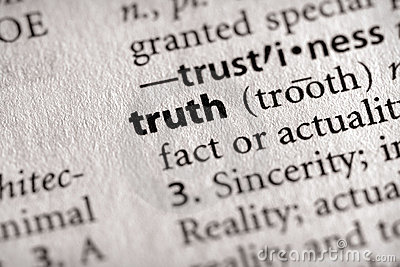Did you know that we are living in the “Post Truth” era?
Post–truth politics (also called post-factual politics and post-reality politics) is a political culture in which debate is framed largely by appeals to emotion disconnected from the details of policy, and by the repeated assertion of talking points to which factual rebuttals are ignored.
This is the climate our children are growing up in and the thought process they are being encouraged to have. It is quite different to our Christian world view where we believe there is truth – God’s truth. Have a read of this great article from my friends at Axis. If you don’t receive their weekly emails, I highly recommend you do to keep up to date with pop culture trends and topics like this one.
__________________
“Your truth”—a phrase that’s entered our lexicon with fervor in recent months and years, thanks to people like Oprah, the #MeToo movement, and a post-truth political climate. In fact, it’s quite a paradoxical phrase, since it combines something that can be subjective (“your”) with something historically considered wholly non-subjective (“truth”). But what do people mean when they say it? Are they referring to something different from “the truth”?
Reading articles like this one from HuffPo or this one from The Atlantic is simultaneously eye-opening, frustrating, and confusing because they challenge our assumptions. Yet it’s important to read these seemingly contradictory points of view in order to grapple not only with what we hear when someone says “Your Truth,” but also with what they actually meant by using it. When marginalized people or victims of injustice use the terminology, they’re giving voice to an alternative story that has often been silenced or dismissed. In this way, the phrase is empowering and can be healing. Of course, not everyone uses the phrase in the same way, but one thing becomes clear: What can be powerful and useful in changing our cultural dialogue can turn dangerous when taken to its extreme (e.g. what if someone’s “truth” is that it’s ok to be a pedophile?).
Regardless of how we feel about this topic, we need to engage it because it is impacting our teenagers. Beyond hearing the phrase or seeing it all over the internet, it’s also being normalized through media. For example, Lutheran pastor Nadia Bolz-Weber recently said (language) that people shouldn’t be shamed for consuming p*rn, as long as it’s “ethically sourced” (i.e. doesn’t use coercion or trafficking). For teenagers who dabble in or are addicted to p*rn, this could easily be seen as validation of “their truth” that p*rnography is good for them.
Another example is Netflix’s new film Cam, a psychological thriller about a woman who makes her living as a sex-cam worker. As Relevant points out, the film subtly tries to validate her chosen profession as normal, good, even empowering. In a sense, she’s portrayed as “living her truth” that as long as it’s on her own terms, using her sexuality for gain is moral and empowering. Young viewers can easily internalize this under-the-radar message and use it to rationalize their desire to post sexy selfies, send nudes, or worse.
Trust us, walking down this path won’t be easy or clear cut, but it will be good, both for you and your teenagers. Here are some possible discussion questions:
- What do you think “your/my/his/her truth” means?
- What do you think other people mean when they say it?
- Does it matter who says it?
- How can it be good? How can it be bad?
- How do we know the truth? What about with something the Bible doesn’t specifically speak about?
- Why is it important to define our terms and choose our words carefully?


Recent Comments